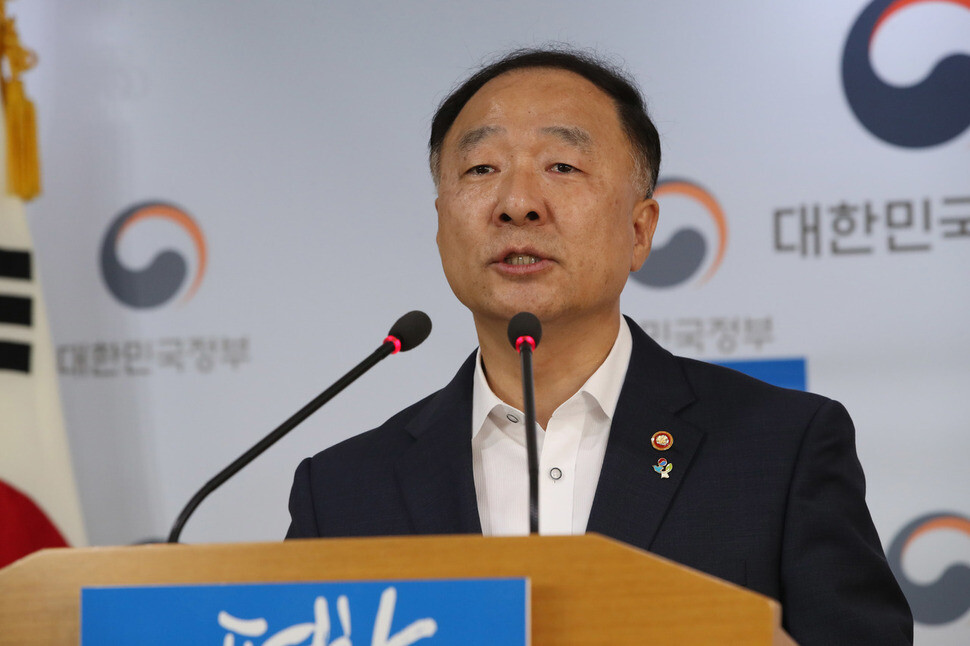hankyoreh
Links to other country sites 다른 나라 사이트 링크
[Editorial] Shin-Kori nuclear reactors to be a case study in deliberative democracy

The South Korean government has decided to temporarily halt construction on the Shin-Kori 5 and 6 nuclear reactors in Ulju County, Ulsan. The decision of whether to resume or abandon construction will be made after setting up a public debate commission and selecting a citizen jury to take part in a deliberative opinion poll. This is a good approach to decision making that can reasonably settle a divisive issue in which various interests are entangled.
At the ceremony announcing the permanent closure of the Kori 1 nuclear reactor on June 19, President Moon Jae-in said that no more nuclear reactors would be built and that operations at the current reactors would be halted at the end of their design life. This means that Moon means to move toward a nuclear power phase-out. During his presidential campaign, he also promised to stop construction on Shin-Kori 5 and 6, on which construction began in June 2016. But he took one step back by pledging to “seek social consensus.” He was apparently seeking to be more cautious in this decision, given the considerable interests that want the construction to proceed. But Korea Hydro & Nuclear Power, which is behind the project, actually sped up the construction. It‘s disturbing to contemplate that this was apparently calculated to increase the sunk cost and thus make it harder to halt the construction. In the end, the government decided to temporarily halt construction and to make its final decision within three months.
If Shin-Kori 5 and 6 are built according to plan, it will considerably delay the time when operations will cease at all of South Korea’s nuclear reactors, complicating efforts to phase out nuclear power. Shin-Kori 6 is scheduled for completion in Oct. 2022, and it has a design life of 60 years. This means that, even if no more nuclear reactors are built, at least one will be running in South Korea until 2082. If a nuclear power phase-out is the right course of action, we should also be looking for ways to accelerate the timing of the nuclear phase-out as much as possible.
The government has said it will set up a public debate committee consisting of people who are not connected with the energy industry and that it will leave the decision to a jury of randomly selected citizens. Nuclear energy policy must be decided in consideration of the entire range of factors -- not only the economy of energy production but also national security, public safety and environmental impact. We must not let policy be shaped by the powerful minority whose interests are at stake here. The interested parties must not be allowed to participate in the decision-making process. If a citizen jury makes it decision after hearing the opinions of the interested parties and experts from various fields and then debating the issue, it will be possible to implement their decision with a sweeping national consensus. This should go down as a case study in deliberative democracy.
Please direct questions or comments to [english@hani.co.kr]

Editorial・opinion
![[Column] Has Korea, too, crossed the Rubicon on China? [Column] Has Korea, too, crossed the Rubicon on China?](https://flexible.img.hani.co.kr/flexible/normal/500/300/imgdb/original/2024/0419/9317135153409185.jpg) [Column] Has Korea, too, crossed the Rubicon on China?
[Column] Has Korea, too, crossed the Rubicon on China?![[Correspondent’s column] In Japan’s alliance with US, echoes of its past alliances with UK [Correspondent’s column] In Japan’s alliance with US, echoes of its past alliances with UK](https://flexible.img.hani.co.kr/flexible/normal/500/300/imgdb/original/2024/0419/2317135166563519.jpg) [Correspondent’s column] In Japan’s alliance with US, echoes of its past alliances with UK
[Correspondent’s column] In Japan’s alliance with US, echoes of its past alliances with UK- [Editorial] Does Yoon think the Korean public is wrong?
- [Editorial] As it bolsters its alliance with US, Japan must be accountable for past
- [Guest essay] Amending the Constitution is Yoon’s key to leaving office in public’s good graces
- [Editorial] 10 years on, lessons of Sewol tragedy must never be forgotten
- [Column] A death blow to Korea’s prosecutor politics
- [Correspondent’s column] The US and the end of Japanese pacifism
- [Guest essay] How Korea turned its trainee doctors into monsters
- [Guest essay] As someone who helped forge Seoul-Moscow ties, their status today troubles me
Most viewed articles
- 1[Column] The clock is ticking for Korea’s first lady
- 2After 2 months of delayed, denied medical care, Koreans worry worst may be yet to come
- 3US overtakes China as Korea’s top export market, prompting trade sanction jitters
- 4[Column] Has Korea, too, crossed the Rubicon on China?
- 5[Correspondent’s column] In Japan’s alliance with US, echoes of its past alliances with UK
- 6Hong Se-hwa, voice for tolerance whose memoir of exile touched a chord, dies at 76
- 7[Editorial] When the choice is kids or career, Korea will never overcome birth rate woes
- 8Samsung barricades office as unionized workers strike for better conditions
- 9All eyes on Xiaomi after it pulls off EV that Apple couldn’t
- 10More South Koreans, particularly the young, are leaving their religions